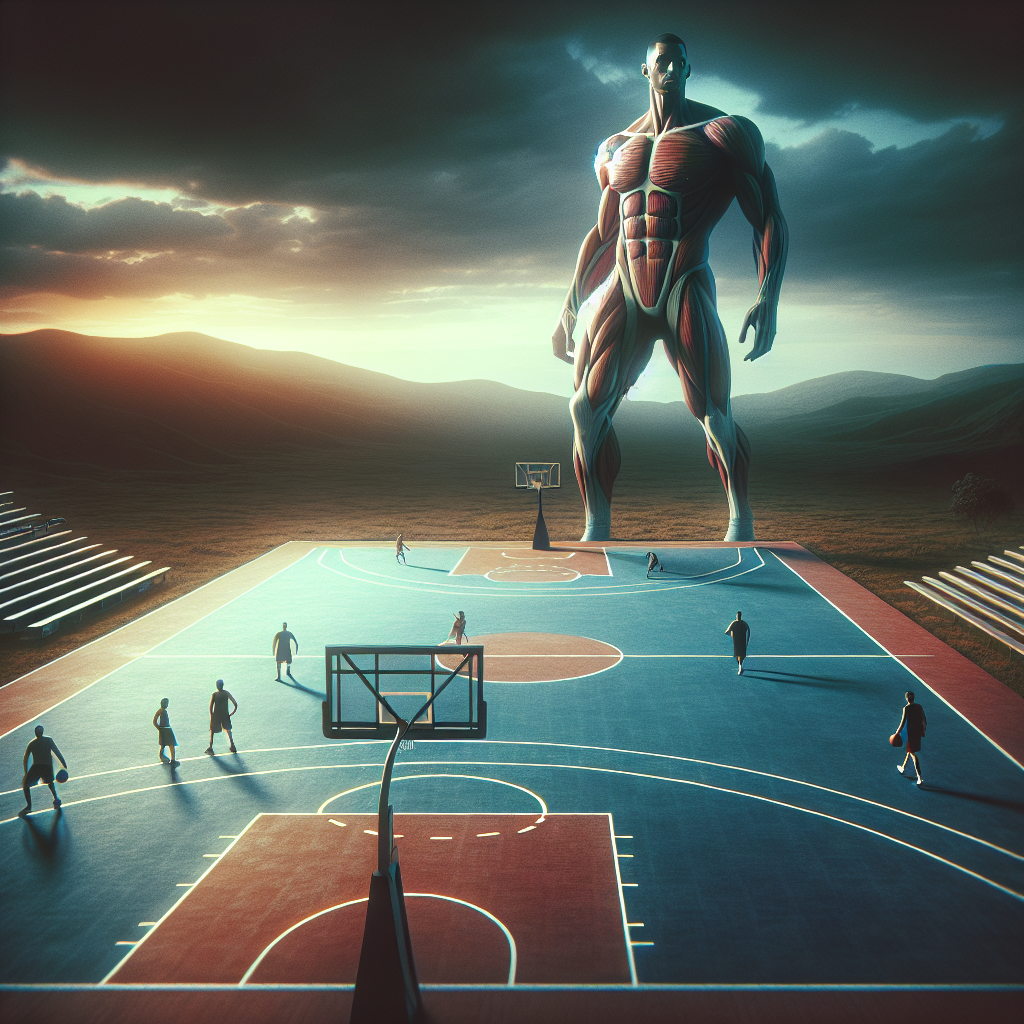Jusuf Nurkic fires back at Shaquille O’Neal

Nurkic’s Response: A Deep Dive into the NBA’s Latest Feud
In the ever-dynamic world of the NBA, where on-court performances often intertwine with off-court narratives, the recent exchange between Jusuf Nurkic and Shaquille O’Neal has captured the attention of basketball enthusiasts and analysts alike. This latest feud, which has unfolded in the public eye, offers a fascinating glimpse into the complexities of player interactions and the broader culture of the league. As we delve into Nurkic’s response to O’Neal, it is essential to understand the context and implications of this exchange.
The origins of this feud can be traced back to comments made by Shaquille O’Neal, a Hall of Famer known for his larger-than-life personality and candid opinions. O’Neal, who has transitioned from a dominant force on the court to a prominent media figure, often shares his unfiltered thoughts on current players. In this instance, his remarks about Nurkic were perceived as dismissive, sparking a reaction from the Portland Trail Blazers’ center. O’Neal’s critique, which centered on Nurkic’s performance and impact, was not an isolated incident but rather part of a broader pattern of commentary that has occasionally drawn the ire of current players.
In response, Jusuf Nurkic chose to address O’Neal’s comments directly, utilizing social media as his platform. This decision reflects a growing trend among athletes who leverage digital platforms to control their narratives and engage with both fans and critics. Nurkic’s response was measured yet pointed, highlighting his awareness of O’Neal’s stature in the basketball community while also asserting his own accomplishments and contributions to the game. By doing so, Nurkic not only defended his reputation but also underscored the importance of respect and recognition in professional sports.
The exchange between Nurkic and O’Neal is emblematic of a broader shift in the NBA’s cultural landscape, where players are increasingly vocal and assertive in addressing criticism. This shift is facilitated by the democratizing power of social media, which allows athletes to bypass traditional media gatekeepers and speak directly to their audience. Consequently, the dynamics of player-media interactions have evolved, with athletes like Nurkic taking a more proactive role in shaping their public personas.
Moreover, this feud highlights the enduring influence of former players like O’Neal, whose opinions continue to resonate within the basketball community. As a respected analyst, O’Neal’s critiques carry weight, yet they also invite scrutiny and debate. This duality underscores the complex relationship between past and present players, where admiration and rivalry coexist. For current players, responding to such critiques is not merely about defending their performance but also about navigating the legacy and expectations set by their predecessors.
In conclusion, the exchange between Jusuf Nurkic and Shaquille O’Neal serves as a microcosm of the evolving dynamics within the NBA. It illustrates how players today are more empowered to engage with criticism and assert their narratives, while also highlighting the ongoing influence of former stars in shaping the discourse around the game. As the league continues to evolve, these interactions will likely become more prevalent, reflecting the changing nature of communication and representation in professional sports. Through this lens, Nurkic’s response is not just a rebuttal but a testament to the agency and voice that modern athletes possess in the ever-expanding world of the NBA.
Shaq vs. Nurkic: The Impact of Public Criticism on Player Performance

In the world of professional basketball, public criticism from former players and analysts is not uncommon. However, when such criticism comes from a towering figure like Shaquille O’Neal, it tends to reverberate more profoundly within the NBA community. Recently, Jusuf Nurkic, the Bosnian center for the Phoenix Suns, found himself in the crosshairs of Shaq’s candid commentary. O’Neal, known for his unfiltered opinions, questioned Nurkic’s performance and impact on the court, sparking a wave of discussions among fans and analysts alike. In response, Nurkic did not shy away from addressing the critique, firing back with a measured yet firm rebuttal that highlighted the complexities of player performance and the effects of public scrutiny.
Nurkic’s response to Shaq’s criticism underscores a broader conversation about the impact of public commentary on athletes. While some players might internalize such criticism, using it as motivation to improve, others may find it detrimental to their mental well-being and on-court performance. Nurkic, in his response, emphasized the importance of understanding the context in which players operate, including team dynamics, injuries, and the evolving nature of the game. By doing so, he not only defended his performance but also shed light on the multifaceted challenges that professional athletes face.
Moreover, Nurkic’s rebuttal serves as a reminder of the evolving relationship between current players and former legends. While past generations of players often revered their predecessors, today’s athletes are more willing to engage in dialogue and defend their positions. This shift reflects a broader cultural change within the NBA, where players are increasingly empowered to voice their opinions and challenge narratives that may not accurately reflect their experiences or contributions.
Transitioning from the individual to the collective, the exchange between Nurkic and O’Neal also highlights the role of media in shaping public perception of player performance. Analysts and commentators wield significant influence, often framing narratives that can affect a player’s reputation and marketability. In this context, Nurkic’s response can be seen as an attempt to reclaim his narrative, ensuring that his perspective is heard amidst the noise of public discourse.
Furthermore, the incident raises questions about the responsibility of former players who transition into media roles. While their insights are invaluable, given their firsthand experience, there is an expectation that they balance critique with empathy, recognizing the pressures and challenges faced by current players. O’Neal’s comments, while perhaps intended to motivate, also serve as a reminder of the fine line between constructive criticism and undue pressure.
In conclusion, the exchange between Jusuf Nurkic and Shaquille O’Neal is more than just a personal spat; it is a reflection of the complex interplay between public criticism and player performance. As athletes navigate the pressures of professional sports, the ability to respond to criticism constructively becomes an essential skill. Nurkic’s measured response not only defended his performance but also contributed to a broader dialogue about the responsibilities of media figures and the impact of their words. As the NBA continues to evolve, such interactions will likely become more common, shaping the future of player-media relations in the process.
The Power of Words: How NBA Players Handle Criticism from Legends
In the world of professional basketball, the intersection of past and present often creates a dynamic dialogue that can influence both players and fans alike. This dialogue is particularly evident when NBA legends, who have left an indelible mark on the sport, offer their critiques of current players. Such was the case when Shaquille O’Neal, a dominant force in the NBA during his career, recently made comments about Jusuf Nurkic, the Bosnian center currently playing for the Phoenix Suns. O’Neal’s remarks, which were critical of Nurkic’s performance and impact on the court, sparked a response from the player, highlighting the complex relationship between criticism and motivation in professional sports.
Jusuf Nurkic, known for his resilience and tenacity, did not shy away from addressing O’Neal’s comments. Instead, he chose to respond with a measured yet assertive rebuttal, emphasizing his commitment to improving his game and contributing to his team’s success. Nurkic’s response underscores a broader trend among NBA players who, rather than being discouraged by criticism from former greats, use it as fuel to enhance their performance. This approach reflects a shift in how athletes perceive and react to public scrutiny, particularly when it comes from those who have previously excelled in the same arena.
The power of words, especially when they come from respected figures like Shaquille O’Neal, cannot be underestimated. For many players, such critiques serve as a reminder of the high standards set by those who came before them. However, the manner in which players choose to handle these critiques can vary significantly. Some may internalize the feedback, using it as a catalyst for personal growth and development. Others, like Nurkic, may opt to publicly address the comments, thereby engaging in a dialogue that not only defends their current standing but also acknowledges the legacy of those offering the critique.
Moreover, the interaction between Nurkic and O’Neal highlights the evolving nature of communication in the digital age. Social media platforms have become a stage where players can directly respond to criticism, allowing them to control the narrative and express their perspectives in real-time. This immediacy can be empowering for athletes, providing them with a voice that can reach millions and potentially reshape public perception.
In addition to personal responses, players often rely on their performance on the court as the ultimate rebuttal to criticism. By focusing on their game and striving for excellence, they can effectively silence doubters and reinforce their value to their teams. This dual approach—combining verbal responses with tangible results—demonstrates the multifaceted strategies players employ to navigate the pressures of professional sports.
In conclusion, the exchange between Jusuf Nurkic and Shaquille O’Neal serves as a compelling example of how NBA players handle criticism from legends. It illustrates the importance of resilience, the strategic use of communication, and the enduring impact of words in the world of sports. As players continue to balance respect for the past with their aspirations for the future, these interactions will remain a vital part of the NBA’s ongoing narrative, shaping both individual careers and the broader landscape of the league.

